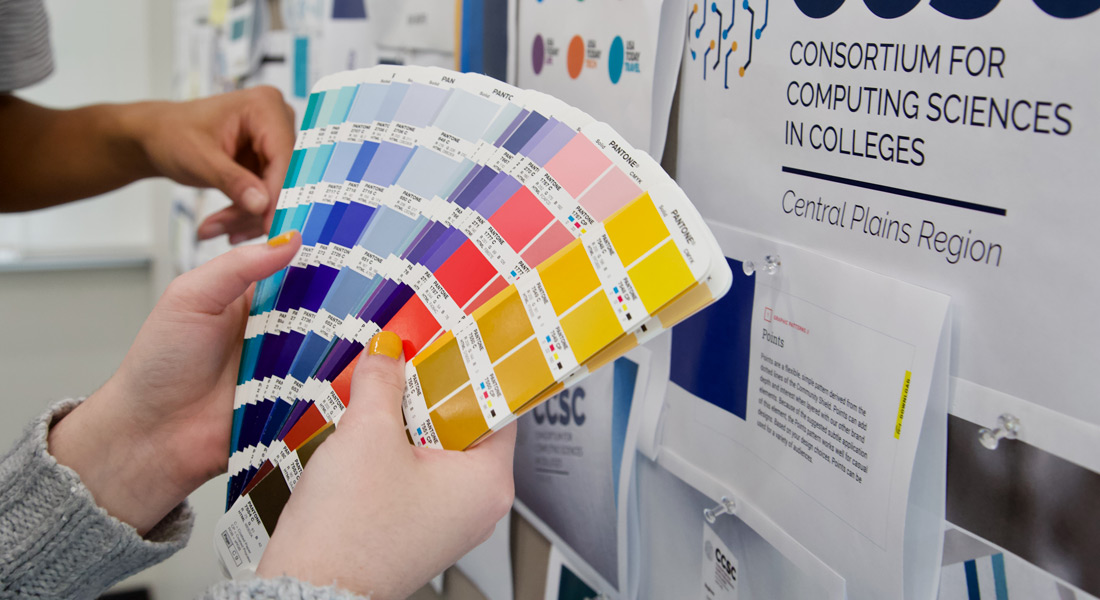IMA COURSES
Take the following courses:
AR-102 Principles of Digital Media
3 CreditsCTDH
CM-133 Mass Media and Society
3 CreditsH, CS
AR-104 Design and Color
3 CreditsF,CTDH
Take one of the following courses:
AR-375 Community Design Lab
3 CreditsSW-LE, CTDHPrerequisite: AR-102 or IM-110; sophomore standing or higher.
AR-376 Business of Design
3 Credits Students must have sophomore standing or higher.
ELECTIVE
Take one of the following courses:
AR-103 Beginning Drawing
4 CreditsF
AR-200 Beginning Painting
4 CreditsF Note: Drawing courses from high school may provide adequate preparation. Please contact the course professor for more information. Note: An additional fee for art supplies is assessed.
AR-203 Digital Photography I
4 CreditsF, WK-CE
AR-204 Digital Art I
4 CreditsF,CTDH,WK-CE
AR-117 Intro to Sculpture
3 CreditsF,WK-CE
AR-225 Wheel Throwing
4 CreditsF,WK-CE Pre-Req or Co-Req: FYC-101 or EN-110 or EN-109
CM-420E Digital Storytelling
3 CreditsH, F, CTDHPrerequisites: CM133 or 1 of the following courses, CM290 or IT110 or AR404.
CM-330 Media Analysis
3 CreditsH, CW, CSPrerequisites: CM132 or CM133.
UPPER-LEVEL ELECTIVE
Take one course at the 300 level or above:
CM-300 Professional Presentations
3 CreditsCS, HPrerequisites: CM200.
CM-330 Media Analysis
3 CreditsH, CW, CSPrerequisites: CM132 or CM133.
CM-420A Hollywood Films
3 CreditsH, CWPrerequisites: CM132 or CM133.
CM-420E Digital Storytelling
3 CreditsH, F, CTDHPrerequisites: CM133 or 1 of the following courses, CM290 or IT110 or AR404.
CM-499 Special Topics
1-4 Credits Prerequisites vary by topic.
IM-310 Social Media
3 CreditsFPrerequisites: IM110 or IT110 or IT111 or CS110.
IT-341 Web Design
2 Credits Prerequisites: CS110 or permission.
IT-342 Web Programming
2 Credits Prerequisite: CS-240. Corequisite: IT-341.
IM-360 Digital Video Production
3 CreditsF,CTDHPrerequisites: IM110 or permission by permission of instructor with prior video experience.
IM-361 Video Production II
3 CreditsF,CTDHPrerequisite: IM360 or by instructor permission.
AR-375 Community Design Lab
3 CreditsSW-LE, CTDHPrerequisite: AR-102 or IM-110; sophomore standing or higher.
AR-376 Business of Design
3 Credits Students must have sophomore standing or higher.
EN-307 Mythology in Film
4 CreditsHPrerequisites: EN110 or EN108 and EN109.
EN-399 Special Topics
1-4 Credits Prerequisites vary by title.
EB-351 Marketing Management
3 CreditsSPrerequisite: EB201.
EB-355 Marketing Strategies
3 CreditsSPrerequisite: EB351.
EB-358 Marketing Research and Analytics
3 CreditsSPrerequisite: EB-351
EB-359 Advertising & Promo Mgmt
3 Credits
EN-376 Writing Across Media
3 CreditsH,CW,CTDHPre-Req: FYC-101 or EN-110 or EN-109.
EN-378 Video Production Writing
4 CreditsH,CW,CTDH,WK-CETake FYC-101 or EN-110 or EN-109
Secondary Emphasis Credit Total = 18
Six credits must be at the 300/400-level. Any course exception must be approved by the advisor and/or department chair.
 skip to content
skip to content




